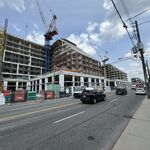cdr108
Senior Member
A rental crunch on the horizon
The downturn in the condo market may have a huge impact on renters
http://www.theglobeandmail.com/servlet/story/RTGAM.20081211.reBelford1212/REStory/RealEstate/home
TERRENCE BELFORD
Globe and Mail
December 11, 2008 at 5:53 PM EST
Here is a question that might take the edge off the holiday season: Is Toronto about to face another rental housing crisis?
Are we indeed heading back 25 years to the mid-1980s when apartment vacancy rates fell to just one or two available units in every thousand?
Gerry DiLeo, a partner in Rental Lifestyle Group Inc., which manages rental apartment buildings and condo suites for investors, says he is concerned. He can see signs of a future shortage.
On the other hand, Jim Ritchie, senior vice-president of sales and marketing at Tridel Corp., which through its Del Condominium Rentals Inc. manages 1,400 suites for investors, says it is too soon to tell. Much will depend on what happens to the condo market this spring and summer.
The last time Toronto faced a shortage of near-epic proportions, it was because of rent controls.
Developers simply stopped building rental buildings because they could not get rents high enough to justify their costs.
What turned the situation around was the surge in new condo construction. Investors — mainly small investors plunking hard-earned savings into one or two units — found they could buy suites then rent them for enough cash to both pay the mortgage and cover monthly maintenance costs.
At the same time a flood tide of new condo buyers took a large chunk of the rental population out of the market and vacancy rates started to climb. Developers that did create new rental projects took the precaution of registering them as condominiums as an exit strategy.
If worst came to worst in the rental market they could always sell their units as condos and get out of the rental business entirely.
That free-market approach to dealing with a social issue worked well for two decades. Unfortunately, it now seems headed straight for a collision with the brick wall of economics.
Rising condo prices have made it near impossible in many parts of the Greater Toronto Area for investors to cover costs through rents.
They are edging out of the market. Since those same investors were the ones who ensured a steady supply of rental units to meet a GTA growth rate of 100,000 new immigrants a year, the inevitable conclusion is we face a shortage somewhere down the line.
It is all in the math, Mr. DiLeo says. A 750-square-foot, one-bedroom-plus-den condo can bring anywhere from $1,750 to $1,900 on the rental market.
But the cost of that condo based on the $545 a square foot being charged for new projects in areas such as the North Yonge corridor weighs in at $408,750.
That means an investor has to fork over almost $82,000 in cash as a 20-per-cent down payment and take out a mortgage for about $327,000. The problem is, $1,750 a month in rent covers only payments on about $280,000 worth of mortgages. Now add in monthly maintenance costs of perhaps 45 cents a square foot, or about $338 a month.
The shortfall is significant.
"The result is that anyone investing today needs a series of very big rent increases to get into the black," Mr. DiLeo says. "The numbers just don't make sense any more for most small investors."
The signs were already visible last spring when Canada Mortgage and Housing Corp. issued its rental market survey. CMHC reported that the vacancy rate for rental suites in structures with three or more units fell to 2.8 per cent in April from 4 per cent in the same month of 2007.
Especially hard hit is downtown Toronto, says Mr. DiLeo. Rental Lifestyle Group's portfolio includes 600 rental condo suites and vacancy rates in that area are running at about 0.5 per cent, he says, adding that that rate is about 1 per cent if you take in the entire city.
"We get more than 400 calls a week from people looking for an apartment," he says. "That is 400 people all vying for maybe 40 that we have available for rent at any one time."
The same holds true among Del's 1,400 suites, which are spread right across the GTA.
"We have virtually no vacancies," Mr. Ritchie says.
Most affected are one-bedroom and one-plus-den units. The latter have been investors' preferred buys because they can handle two tenants willing to split the rent. In a pinch, one can sleep in the den.
By comparison, Mr. DiLeo says, a 645-square-foot one-bedroom suite now goes for between $1,450 and $1,650 a month on the rental market and there is no shortage of takers.
The only area where the condo rental market still offers a reasonable supply of suites is larger units. But, at the same time, an 880-square-foot, two-bedroom suite can run anywhere from $2,000 to $3,000 a month.
Now, as for timing: Supply is already starting to shrink, and as vacancy rates fall, rent increases are certain to follow. The real crunch will not likely happen until the end of this decade.
"Right now we have under way all those suites sold to investors in 2006 and the boom year of 2007," Mr. Ritchie says. "They will start coming onto the rental market towards 2009 or 2010."
But with condo sales down now and with more modest sales expected in 2009, and with investors no longer snapping up about 30 per cent of the suites in most downtown projects because of rising prices, what comes next?
"[It's] really too soon to tell," Mr. Ritchie says. "Right now investors seem to be taking a wait-and-see attitude. What counts is what happens next year."
"I think the situation poses grave concern for the future of this city," Mr. DiLeo says. "Right now, nobody knows what might happen."
The downturn in the condo market may have a huge impact on renters
http://www.theglobeandmail.com/servlet/story/RTGAM.20081211.reBelford1212/REStory/RealEstate/home
TERRENCE BELFORD
Globe and Mail
December 11, 2008 at 5:53 PM EST
Here is a question that might take the edge off the holiday season: Is Toronto about to face another rental housing crisis?
Are we indeed heading back 25 years to the mid-1980s when apartment vacancy rates fell to just one or two available units in every thousand?
Gerry DiLeo, a partner in Rental Lifestyle Group Inc., which manages rental apartment buildings and condo suites for investors, says he is concerned. He can see signs of a future shortage.
On the other hand, Jim Ritchie, senior vice-president of sales and marketing at Tridel Corp., which through its Del Condominium Rentals Inc. manages 1,400 suites for investors, says it is too soon to tell. Much will depend on what happens to the condo market this spring and summer.
The last time Toronto faced a shortage of near-epic proportions, it was because of rent controls.
Developers simply stopped building rental buildings because they could not get rents high enough to justify their costs.
What turned the situation around was the surge in new condo construction. Investors — mainly small investors plunking hard-earned savings into one or two units — found they could buy suites then rent them for enough cash to both pay the mortgage and cover monthly maintenance costs.
At the same time a flood tide of new condo buyers took a large chunk of the rental population out of the market and vacancy rates started to climb. Developers that did create new rental projects took the precaution of registering them as condominiums as an exit strategy.
If worst came to worst in the rental market they could always sell their units as condos and get out of the rental business entirely.
That free-market approach to dealing with a social issue worked well for two decades. Unfortunately, it now seems headed straight for a collision with the brick wall of economics.
Rising condo prices have made it near impossible in many parts of the Greater Toronto Area for investors to cover costs through rents.
They are edging out of the market. Since those same investors were the ones who ensured a steady supply of rental units to meet a GTA growth rate of 100,000 new immigrants a year, the inevitable conclusion is we face a shortage somewhere down the line.
It is all in the math, Mr. DiLeo says. A 750-square-foot, one-bedroom-plus-den condo can bring anywhere from $1,750 to $1,900 on the rental market.
But the cost of that condo based on the $545 a square foot being charged for new projects in areas such as the North Yonge corridor weighs in at $408,750.
That means an investor has to fork over almost $82,000 in cash as a 20-per-cent down payment and take out a mortgage for about $327,000. The problem is, $1,750 a month in rent covers only payments on about $280,000 worth of mortgages. Now add in monthly maintenance costs of perhaps 45 cents a square foot, or about $338 a month.
The shortfall is significant.
"The result is that anyone investing today needs a series of very big rent increases to get into the black," Mr. DiLeo says. "The numbers just don't make sense any more for most small investors."
The signs were already visible last spring when Canada Mortgage and Housing Corp. issued its rental market survey. CMHC reported that the vacancy rate for rental suites in structures with three or more units fell to 2.8 per cent in April from 4 per cent in the same month of 2007.
Especially hard hit is downtown Toronto, says Mr. DiLeo. Rental Lifestyle Group's portfolio includes 600 rental condo suites and vacancy rates in that area are running at about 0.5 per cent, he says, adding that that rate is about 1 per cent if you take in the entire city.
"We get more than 400 calls a week from people looking for an apartment," he says. "That is 400 people all vying for maybe 40 that we have available for rent at any one time."
The same holds true among Del's 1,400 suites, which are spread right across the GTA.
"We have virtually no vacancies," Mr. Ritchie says.
Most affected are one-bedroom and one-plus-den units. The latter have been investors' preferred buys because they can handle two tenants willing to split the rent. In a pinch, one can sleep in the den.
By comparison, Mr. DiLeo says, a 645-square-foot one-bedroom suite now goes for between $1,450 and $1,650 a month on the rental market and there is no shortage of takers.
The only area where the condo rental market still offers a reasonable supply of suites is larger units. But, at the same time, an 880-square-foot, two-bedroom suite can run anywhere from $2,000 to $3,000 a month.
Now, as for timing: Supply is already starting to shrink, and as vacancy rates fall, rent increases are certain to follow. The real crunch will not likely happen until the end of this decade.
"Right now we have under way all those suites sold to investors in 2006 and the boom year of 2007," Mr. Ritchie says. "They will start coming onto the rental market towards 2009 or 2010."
But with condo sales down now and with more modest sales expected in 2009, and with investors no longer snapping up about 30 per cent of the suites in most downtown projects because of rising prices, what comes next?
"[It's] really too soon to tell," Mr. Ritchie says. "Right now investors seem to be taking a wait-and-see attitude. What counts is what happens next year."
"I think the situation poses grave concern for the future of this city," Mr. DiLeo says. "Right now, nobody knows what might happen."
Last edited:




